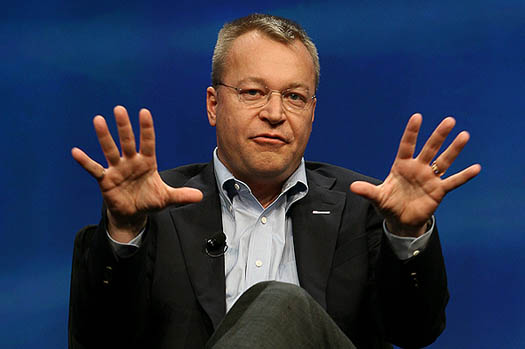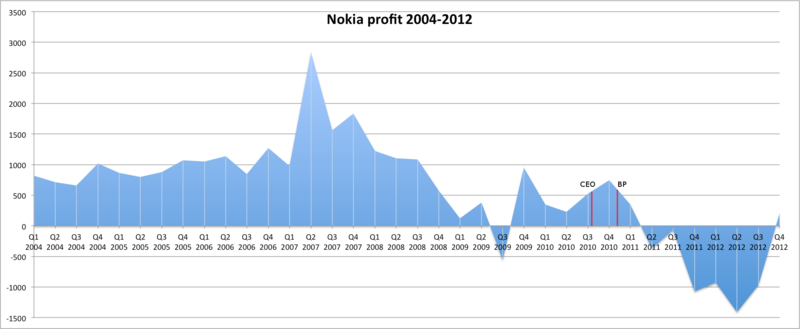Nokia and the Elop effect: continued

Last Sunday, I already wrote about Stephen Elop, "Burning Platform" and a sharp change in the fate of Nokia. Alas, now I see that the focus of the article was taken somewhat incorrectly, and the general essence turned out to be hard to understand and misunderstood by many, and I found the most interesting data after the publication of the article. In this brief article, which complements the first one, I will try to correct the mistake by focusing on one question only: what was the dynamics of Nokia’s development in the period prior to the release of the Burning Platform, and how urgent were necessary decisive measures, regardless of the nature and consequences of these measures?
Also this time, I preferred to completely abandon data from third-party sources and build graphs based solely on Nokia’s quarterly reports . Of course, I still recommend everyone interested in Nokia's fate to pay attention to the Communities blog Dominate Brands , but in this case I will not use any information from there - Ahonen, with all its undoubted merits as an analyst, biased about Elop, which is quite Expected for a Finn and a former Nokia employee. I want to focus solely on objective impersonal data. So let's get started.
Let's start with the sad: Nokia’s profit chart for 2004-2012:
')

The labels “CEO” and “BP” denote, respectively, the moment when Stephen Elop became the CEO of Nokia (September 2010) and the release of the appeal “Burning Platform” (February 2011). In fact, the turning point in Nokia’s history is precisely the second point, the first one I note for clarity only.
So, we see that after the peak (2007–2008) and the fall (2009), Nokia’s profit remained at a lower level than in previous years. That is, Elop came to the company when she was going through hard times, and this is undoubtedly.
But Nokia is a big company, and it is engaged not only in mobile phones, but also in telecommunications equipment (Nokia-Siemens Network) and, since the purchase of Navteq in 2008, with navigation and maps. The grounds for Elop’s actions, if they were in Nokia’s position, should have been negative trends in smartphones. Let's dig again, in the past, covering the operational profit of Nokia from mobile phones and services for 2004-2012:

And this is more interesting. Here, a blue graph means profit, while orange — averaged over three quarters of profit — is added so that peaks and dips can be smoothed out and the overall picture can be assessed more clearly. As can be seen from the graph, already in the middle of 2009, the profits from the phones (including smartphones) almost returned to the level up to the peak of 2007-2008. There is no reason for panic and for statements like "Nokia, our platform is burning" is not yet visible.
Maybe it's the smartphones? It was smartphones that suffered disaster, and the schedule remained smooth due to profits on ordinary phones? Well, there is an answer to this question. Fortunately, in the quarterly reports Nokia has information on operating profit from smartphones, starting in 2010:

For the 2010th year, Nokia’s profit for smartphones has grown more than two and a half times. Still not like “the numerous hot spots that feed the raging flames around us,” doesn’t it? But, maybe, at the same time production fell?

Wow, what a bad luck. Production also grew. It grew more slowly than the profit, which shows that the profit from one smartphone also grew - and doubled over the 2010th year.
Let's sum up:
- In 2010, smartphone sales grew and did not have a downward trend.
- The margin on smartphones grew and for the 2010th year has doubled.
- The profits of the smartphone division grew and for the 2010th year increased two and a half times.
- Overall, profits from mobile devices have stabilized at a level just below 2004-2006.
As far as can be seen from the official reports of Nokia, neither in the position of Nokia at the beginning of 2011, nor in the dynamics of the company, were there any prerequisites for Burning Platform. The company did not need a sharp change of course - “anti-crisis measures” taken by Elop were not in the interests of Nokia. Eop's assurances to the contrary is a deliberate lie.
It is useless to try to guess what guided Elop and how far Nokia's current position corresponds to his plan - this we cannot know. We cannot even say with certainty that the catastrophic events of 2011 are a direct result of Elop’s actions, and not a wonderful coincidence. All that we can be sure of - Nokia was not on the “burning platform”, did not need to change plans, and what Stephen Elop did was not in the interests of Nokia as a mobile phone manufacturer.
Source: https://habr.com/ru/post/168785/
All Articles